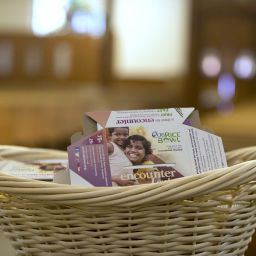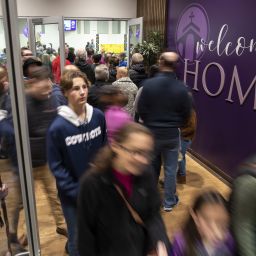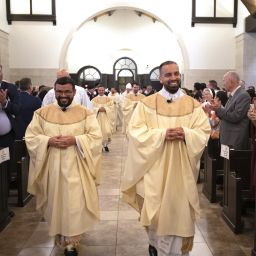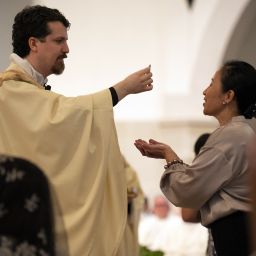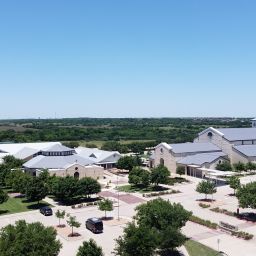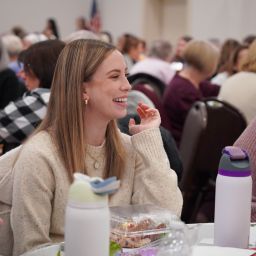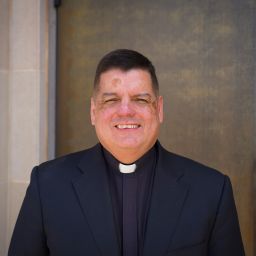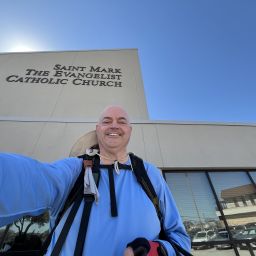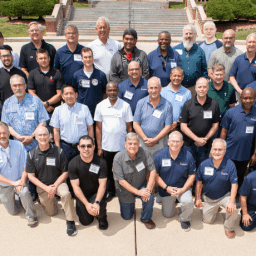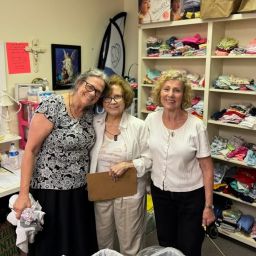By Amy White
The Texas Catholic
For those who have lost a loved one, the holiday season can introduce difficult firsts—the first Thanksgiving without a parent, Christmas without a child, New Year’s Eve without a spouse.
Carrie Simon, a St. Gabriel the Archangel parishioner whose child passed away 15 years ago, said she has felt that holiday grief firsthand.
“Holidays are hard. Even 15 years later, they’re hard,” she shared. “It just affects everything, you know—your Christmas traditions, your presents in the morning. You’re just missing someone. Part of you is missing, because they’re not there.”
As those grieving the death of a loved one attempt to navigate the challenges of loss, they can look to their church communities for support. Across the Diocese of Dallas—from McKinney to Plano to Frisco to Allen—parishes have resources to accompany those who are grieving, both during the holidays and through the whole year.
‘Talking helps’
When Simon experienced the loss of her loved one, she began the long journey of healing from her grief. She now gives back by holding space for others to grieve their losses.
Along with co-lead Jim Casey, Simon heads the Grief Ministry group at St. Gabriel the Archangel Catholic Community in McKinney.
Each meeting, the participants gather at the Annunciation room in the church, open with prayer, and begin to share.
“We normally go around in a circle and ask them: How are you doing? How are you feeling? What’s going on in your life right now,” she explained.
Simon said the group uses two resources to guide their discussions: “The New Day Journal” and “Grieving with the Help of Your Catholic Faith.” But most of the time, those resources aren’t needed in the meetings. People simply talk about their experience of grief as they go around the circle and, through the course of the meeting, the conversation takes on a life of its own.
“Talking helps,” Simon said. “The most helpful thing for people going through grief is to be able to talk about it with other people that understand what you’re going through.”
Participants share their specific experiences of heartache—their difficulty returning to Mass after their loss; or the emotion that wells up each time they watch a show that reminds them of their loved one; or the experience of returning to a too quiet home at the end of the day. In the Grief Ministry meetings, the bereaved have space to talk about these struggles with people who have experienced the same thing.
“Going to church and crying constantly—People are like, ‘Is that normal?’ Yes, that’s very normal,” Simon said. “For the most part, people just like to talk and just know they’re not alone, that the things they’re feeling aren’t weird or crazy.”
During the holiday season, the ministry hosts its Grief and the Holidays events. At these meetings, the bereaved can talk about how they plan to honor their loved ones during the festivities or discuss the traditions they’ll keep or let go.
Several Grief Ministry participants have struck with the group for multiple years, Simon said. They offer the assurance to members with more recent losses: You will make it through.
“It’s a process of listening to other people, knowing you’re not alone and that they understand how you’re feeling,” Simon said. “Eventually, they get to a point where they can sit and talk about it and not cry.”
Breaking bread
Much like St. Gabriel’s Grief Ministry, a joint bereavement ministry of St. Mark the Evangelist and Our Lady of Angels, their Faith & Grief group, brings people together to support each other in the mourning process—this time, over a meal.
“The basis of Faith & Grief is sharing a meal,” Liz Gilligan, an Our Lady of Angels Faith & Grief facilitator, said. “In our group, it’s always a luncheon; and it seems to make it easier for people to be able to communicate with each other.”
“They have something to do with their hands,” Alana Ackels, another facilitator, explained. “We know that if we go out to dinner or something with friends, how you just talk and eat and talk; it is a communal thing. It’s the breaking of bread, just as Jesus taught us.”
The first Wednesday of each month, the group gathers in St. Mark’s McGivney Hall for a meal. These one-hour luncheons include a short address from a speaker followed by table discussion on topics like hope, belonging, or anger.
During these luncheon discussions, Gilligan and Ackels said, the presence of the Holy Spirit is evident.
Ackels recalled one participant whose child had died of a very rare form of cancer; upon arriving at a Faith & Grief luncheon for the first time, she heard the event’s speaker share about the loss of a child to that same rare cancer.
“You really felt the Holy Spirit there saying, ‘You need to be here.’ And to the speaker, ‘You need to be here,’” Ackels said. “And they all cried together, because the speaker couldn’t believe that she was there.”
Gilligan said the meals provide the space and time to grieve months, years, even decades after the loss—when the griever’s family and friends may feel that the grief should be over.
“We’ve had people that have come 17 years after they lost someone and it’s just hitting them now,” Gilligan said. “Grief has no timeline.”
‘The after people’
Besides the grief group, Gilligan and Ackels both also serve as Stephen ministers in their parish. Stephen Ministries, a ministry of one-on-one accompaniment, has spread to 13,000 congregations since its founding in 1975—including several in the Diocese of Dallas.
Group leaders pair a Stephen minister, or “caregiver,” with a care-receiver to accompany them through whatever crises the care-receiver may face—from loss of a loved one to relationship difficulties to career stress.
“We’re ‘the after people,’” Gilligan said. “We’re after you lose your job. We’re after you have your divorce. We’re just basically walking with people and listening and praying with them.”
Margaret Scott, a parishioner of St. Francis of Assisi Catholic Church in Frisco, helped introduce the ministry to St. Francis in 2018. She said that the caregivers in the ministry feel truly called to give themselves to those who are struggling.
“Jesus bore our grief and carried our sorrows, and so that’s what the Stephen Ministry does is to help hurting people, bring them to Jesus’ cross to find healing and hope,” Scott said. “And that’s why the motto for our program is ‘Christ caring for people through people.’”
Scott said the ministry is not counseling, but it is confidential. Stephen ministers receive training on topics like empathy, assertiveness, and various kinds of losses they may encounter when ministering to the care-receivers.
The goal is to help the struggling person work through their crisis to find healing. Each pair meets once a week, in person, for an hour.
“We are there to listen, to encourage, to support,” Scott explained. “We are there to just help them see how to work through things.”
Scott said that parish grief ministries, like Stephen Ministry and other groups across the diocese, are a way that the church community can serve as a safe space for those in need. These ministries support suffering members of the community as they make their way through the grieving process—from hurt to resilience to healing—however long that process may take.
“The Church stands for reaching out to other people, reaching out and helping those in need,” Scott said. “That’s just the nature of the Church.”
Cutline for featured image: Doug DeVore, center, bows his head in prayer during the Service of the Longest Night held at St. Meinrad Archabbey in St. Meinrad, Ind., Dec. 14, 2019. DeVore attended the service, which was held for those grieving during the holiday season, to honor his late father, John. (Catholic News Service)

